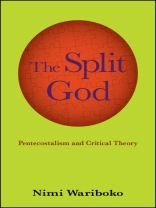Offers a critical Pentecostal philosophy of God that challenges orthodox Christianity.
Although Pentecostalism is generally considered a conservative movement, in The Split God Nimi Wariboko shows that its operative everyday notion of God is a radical one that poses, under cover of loyalty, a challenge to orthodox Christianity. He argues that the image of God that arises out of the everyday practices of Pentecostalism is a split God-a deity harboring a radical split that not only destabilizes and prevents God himself from achieving ontological completeness but also conditions and shapes the practices and identities of Pentecostal believers. Drawing from the work of Slavoj Žižek, Jacques Lacan, Jean-Luc Nancy, and Giorgio Agamben, among others, Wariboko presents a close reading of everyday Pentecostal practices, and in doing so, uncovers and presents a sophisticated conversation between radical continental philosophy and everyday forms of spirituality. By de-particularizing Pentecostal studies and Pentecostalism, Wariboko broadens our understanding of the intellectual aspects of the global Pentecostal and Charismatic movements.
Spis treści
Acknowledgments
Preface
Introduction: Thinking at the Boundary
1. Day of Pentecost: The Founding Violent Gesture of Splits
2. Spiritual Discernment: Bathroom Mirror as Metaphor
3. The Beauty, Skin, and Monstrosity of Grace
4. The Sacred as Im/possibility: Expect a Miracle!
5. The Impossible Possibility, Capitalism, and the Pentecostal Subject
6. Worship as Pure Means
7. Everyday Form of Theology: Between Pentecostal Apparatus and Prosaic Existence
Conclusion: Ethical Implications of a Split God
Notes
Bibliography
Index
O autorze
Nimi Wariboko is Walter G. Muelder Professor of Social Ethics at Boston University. His previous books include The Split Time: Economic Philosophy for Human Flourishing in African Perspective, also published by SUNY Press, and Transcripts of the Sacred in Nigeria: Beautiful, Monstrous, Ridiculous.







![Pokrywa Brian Schrag & Julisa Rowe: Community Arts for God's Purposes [Chinese] 貼近神心意的社群藝術 Pokrywa Brian Schrag & Julisa Rowe: Community Arts for God's Purposes [Chinese] 貼近神心意的社群藝術](https://static.worldofdigitals.com/thumb_webp/740/9781645083740.webp)




